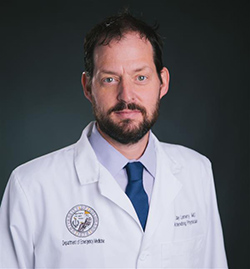‘STATE OF THE AIR’ REVEALS DIRE POLLUTION STATISTICS
CU Climate & Health Program leader Jay Lemery, MD, discusses report
By Greg Glasgow
October 2024
Just under 40% of Americans — 131.2 million people — live in places with failing grades for unhealthy levels of ozone or particle pollution.
That’s a key finding from the latest “State of the Air” report from the American Lung Association (ALA), released last spring. The latest edition of the annual publication ranks cities and grades counties based on ozone and particle pollution during 2020, 2021, and 2022, based on official data from the U.S. Environmental Protection Agency (EPA).
This year’s report ranks the Denver-Aurora area the sixth worst in the country for high ozone days. Douglas County, in the south Denver metro area and inclusive of cities such as Parker, Lone Tree, Highlands Ranch, and Castle Rock, is ranked the 10th worst county in the U.S. for ozone pollution.
 Denver skyline.
Denver skyline. According to the National Center for Atmospheric Research, Colorado’s high ozone numbers are attributable to emissions from oil and gas operations and traffic, as well as the state’s unique geography, wind patterns, and plentiful days of sunshine each year.
The 2024 “State of the Air” report also finds significant disparities among those living in the most polluted areas.
“Although people of color make up 41.6% of the overall population of the U.S., they are 52% of the people living in a county with at least one failing grade,” the report reads. “In the counties with the worst air quality that get failing grades for all three measures of air pollution (ozone, short-term particle pollution, and year-round particle pollution), 63% of the nearly 44 million residents are people of color, compared to 37% who are white.”
Jay Lemery, MD, co-director of the Climate & Health Program in the University of Colorado School of Medicine, discusses the report’s findings and what they mean.
One key finding in the “State of the Air” report is that a combination of extreme heat, drought, and wildfires is creating more particle pollution. Can you talk about why that is and how that affects our health?
Wildfire seasons are becoming longer and more intense, and they’re burning larger swaths of land. The Canadian wildfires last spring were devastating for a couple of days, especially in places like New York City. Wildfires are a stressor for people with physiologic vulnerabilities — the very young, the very old, very sick people with diseases like cancer — who have such a limited physiologic reserve that when they go outside and take a deep breath, they can get what we call reactive airway disease. We’ll see young people come in and say, “I never knew I had asthma.” And the answer is, “You don’t have asthma, you’re just having an asthma-like reaction in your lungs from particulate matter.”
How are air pollution-related complications diagnosed?
We know that chronic exposure can cause heart disease and chronic lung disease, so that is a health risk in and of itself. But when there’s extreme heat and high particulate matter in the air, and people are huffing and puffing, for most of them it’s no big deal. You go inside, and it goes away.
 Jay Lemery, MD
Jay Lemery, MDBut for people who are older or on oxygen or have comorbidities, that’s enough to push them over the edge. They show up in the ER with chest pain, shortness of breath, or even a diabetic complication.
That attribution can be really tricky to figure out after the fact. Public health researchers will go back and say, “This is the average census for chest pain and shortness of breath that we see this time of the year when temperatures are normal, but let’s go back and look at what happened when that wildfire smoke descended on Denver.” We want to get our public health agencies and our hospitals aligned to understand that wildfire smoke kills, and extreme heat kills. We want to make sure we’re protecting our patients.
The ALA report also found that four in 10 people in America live in places with unhealthy levels of air pollution. Beyond seasonal wildfires, why is that happening?
Industrial processes cause it, and we know that extreme heat causes it as well. It degrades air. There are now historic heat waves happening in every town in America. It used to be two weeks where it was really hot; now it’s six or eight weeks. Air quality is now degraded longer because of the extreme heat. The rollback of the EPA’s ability to enforce these things poses an additional threat. If polluters don’t have a reason not to pollute, they’re going to pollute, because it’s easier and less expensive. It’s a very straightforward proposition where we need regulatory oversight over industrial processes, because that’s what protects our air.
The “State of Air” finds disparities among racial and ethnic groups and income classes, in terms of who is living in areas where air pollution is worse. Why does that happen?
These populations often live in places that are closer to industrial plants, have more highways running through them. There’s less green space, and these urban heat islands don’t cool off at night because they’re all blacktop, as opposed to grass and dirt. People want to live where all the green space is, which tends to be in higher-income neighborhoods.
What do you make of the fact that the ALA’s air pollution numbers overall are worse this year than they were last year?
We know it’s a threat. Between wildfires and degraded air quality and heat, those factors are getting worse. There are more pressures on society. The take-home message is that this continues to affect our health, and it’s caused by climate change. These are drivers, and they’re force multipliers.
Wildfires have always existed, but not like this. Heat has always existed, but not like this. This is more data to support what we know, which is that air pollution is increasingly affecting our health, and it’s something we have to take seriously and use all of our tools—both clinical and health policy—to address. Policymakers ultimately need data, and I consider this report to be evidence for policymakers.